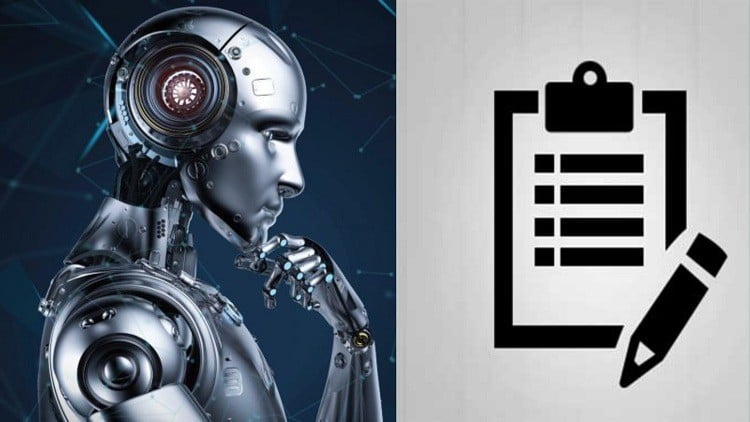
Latest Questions on Robotics
⭐ 4.40/5 rating
👥 17,618 students
🔄 October 2023 update
Add-On Information:
Note➛ Make sure your 𝐔𝐝𝐞𝐦𝐲 cart has only this course you're going to enroll it now, Remove all other courses from the 𝐔𝐝𝐞𝐦𝐲 cart before Enrolling!
-
Course Overview
- This course transcends robotic engineering to explore the profound societal, ethical, and philosophical questions intelligent machines introduce. We examine core inquiries challenging our understanding of technology, humanity, and the future.
- It emphasizes critical thinking about the robotics revolution, unpacking complex scenarios and theoretical frameworks rather than technical programming.
- We meticulously define autonomy and agency in robotic systems, questioning where responsibility lies when intelligent agents make decisions with far-reaching consequences.
- The curriculum tackles pressing ethical dilemmas: potential AI consciousness, sentience, and the moral status of advanced non-human entities. Discussions include rights, if any, of sophisticated AI.
- A significant focus is on the socio-economic impacts of widespread robotic deployment, including job displacement, wealth distribution, changing work dynamics, and new human-robot co-existence models.
- We scrutinize psychological and cultural shifts from human-robot interaction, exploring implications of companion robots, automated caregivers, and blurring lines between organic and synthetic relationships.
- The course traces historical philosophical roots of automation and artificial beings, from ancient myths to modern science fiction, contextualizing contemporary anxieties and aspirations.
- Prepare for engaging debates on data privacy in an IoT-enabled robotic world, weaponization of autonomous systems, and long-term sustainability of automated societies.
- This interdisciplinary journey integrates perspectives from philosophy, ethics, conceptual computer science, sociology, and law for a holistic understanding of robotics’ foundational questions.
-
Requirements / Prerequisites
- No prior coding or advanced technical robotics knowledge is required; the focus is on conceptual understanding and critical analysis.
- A strong curiosity about technology’s future and intelligent machines’ impact on human society and individual existence is paramount.
- Participants need strong critical thinking and analytical reasoning skills to dissect complex arguments and construct well-supported positions.
- The ability to engage in thoughtful, respectful, and evidence-based discussions is crucial, as learning occurs through facilitated debates and peer interaction.
- Comfort with reading and interpreting academic papers, philosophical texts, and theoretical frameworks from diverse scholarly disciplines is beneficial.
- An open-minded approach to diverse viewpoints and challenging established conventions regarding humanity’s place in an automated world is highly encouraged.
- Basic familiarity with ethical theory concepts (e.g., utilitarianism, deontology) is helpful but foundational concepts will be introduced.
- The primary prerequisite is a willingness to ponder deeply, question assumptions, and explore the grey areas defining the frontier of robotics and AI.
-
Skills Covered / Tools Used
- Advanced Analytical Reasoning: Hone the ability to break down multifaceted ethical dilemmas and philosophical problems, identifying underlying assumptions and implications.
- Enhanced Critical Thinking: Develop a sophisticated capacity to evaluate information critically, distinguish objective facts from subjective interpretations, and recognize biases in AI and robotics discourse.
- Ethical Framework Application: Learn to apply major ethical theories (e.g., consequentialism, deontology, virtue ethics) to novel scenarios involving autonomous agents, making reasoned moral judgments.
- Strategic Debate and Discussion: Cultivate skills in articulating complex philosophical and ethical positions clearly, engaging in constructive dialogue, and respectfully challenging opposing viewpoints.
- Interdisciplinary Synthesis: Gain proficiency in integrating knowledge from disparate fields—philosophy, sociology, cognitive science, legal studies—to form comprehensive insights into robotic challenges.
- Futures Thinking & Scenario Planning: Acquire methodologies for anticipating long-term consequences of technological advancements, developing plausible future scenarios, and evaluating their ethical dimensions.
- Effective Research and Information Curation: Improve ability to identify credible sources, synthesize complex information from academic and popular media, and present findings concisely.
- Conceptual Toolkits: Engage with frameworks for understanding robot autonomy, moral patiency, accountability in AI systems, and social contract implications of advanced technology.
- Case Study Analysis: Utilize real-world and hypothetical scenarios as intellectual ‘tools’ to systematically examine practical manifestations of fundamental questions in robotics.
-
Benefits / Outcomes
- Nuanced Perspective Development: Graduates gain a sophisticated understanding of robotics beyond popular discourse, appreciating its complexities beyond technological hype or fear.
- Enhanced Ethical Leadership: Develop knowledge and reasoning skills essential for contributing to ethical policy-making, responsible AI development, and leading future technological governance discussions.
- Improved Critical Engagement: Become a more informed and discerning participant in public conversations about emerging technologies, capable of cutting through misinformation and contributing valuable insights.
- Career Advancement Potential: Ideal for roles in technology ethics, public policy, futurism, tech journalism, regulatory affairs, social impact consulting, or advanced interdisciplinary academic research.
- Refined Intellectual Agility: Strengthen your ability to navigate ambiguous situations and apply abstract philosophical concepts to concrete technological challenges, a highly valued skill in modern professional environments.
- Personal Growth and Awareness: Gain a deeper understanding of human nature, consciousness, and society’s evolving relationship with technology, fostering a more self-aware and critically reflective individual.
- Network Expansion: Connect with a community of like-minded individuals, academics, and professionals passionate about the ethical and philosophical dimensions of robotics and AI.
- Foundational Insight for Innovation: Provides crucial ethical and societal context for building truly responsible and beneficial robotic systems, even for those pursuing technical paths.
-
PROS
- Stimulates profound intellectual curiosity and encourages deep philosophical inquiry into humanity’s future.
- Highly relevant and timely content addressing pressing societal challenges posed by advanced technology.
- Offers an essential interdisciplinary perspective, enriching understanding beyond a single academic domain.
- Excellent for developing robust ethical reasoning and critical thinking skills applicable across various fields.
- Engaging, discussion-based format fosters active learning and peer-to-peer intellectual growth.
- Provides a unique foundation for understanding the broader implications of AI and robotics, moving beyond technical specifics.
-
CONS
- May not satisfy learners primarily seeking hands-on, practical coding or engineering skills in robotics development.
Learning Tracks: English,Teaching & Academics,Engineering
Found It Free? Share It Fast!